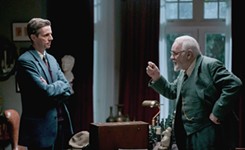
The World to Come
2021, R, 98 min. Directed by Mona Fastvold. Starring Katherine Waterston, Vanessa Kirby, Casey Affleck, Christopher Abbott, Karina Ziana Gherasim.
REVIEWED By Steve Davis, Fri., Feb. 12, 2021
The notion of sexual identity – gay, straight, or otherwise per the ever-expanding alphabet soup of orientative labels – is a fairly modern one. For the two pioneer women who unexpectedly become lovers in the swoony proto-feminist The World to Come, the bewildering and yet enthralling attraction each experience for the other is an unspeakable love in the Whitmanesque sense: It cannot be named because the day’s language lacked the words to articulate it. Coincidentally (or not), the film takes place somewhere on the Eastern seaboard frontier in 1856, only a year after the inaugural publication of Whitman’s seminal collection of free verse poetry, The Leaves of Grass. Just as his homoerotically coded poem “Song of Myself” may identify Walt as gay today, a contemporary reading of The World to Come may likewise perceive its star-crossed inamoratas Abigail (Waterston) and Tallie (Kirby) as lesbians, even though both are married to men, albeit in presently sexless relationships by their own choice.
Whether the thing that compels these two women to embark on a passionate and increasingly reckless liaison right under their cuckolded spouses’ noses is an innate urge or one forged by circumstance is unclear, given the contextual setting. Whatever it is, Abigail and Tallie see each other as something more than their respective farmer-husbands Dyer (a sympathetic Affleck, bearded again) and Finney (a harder-edged Abbott) struggle to understand, more than just a marital appendage whose purpose is defined by menial chores and wifely duties in the bedroom. All too aware of the long-term difficulty of their situation, they are, to borrow from King Lear, “two alone [who] shall sing like birds in a cage” for however long they can.
Ron Hanson and Jim Shepard’s screenplay (adapted from one of the latter’s short stories) uses Abigail’s daily journal entries to narrate the film, which allows her interior voice to dominate among the quartet of principal characters. While this contrivance gives full expression to her romantic awakening – the repeated elation of “astonishment and joy” in her diary following the women’s first chaste kiss is particularly moving – it binds the film to written words that sometimes mute the drama. Nevertheless, Waterston’s delicate performance inspires deep empathy. In the early scenes, the lonesome Abigail is a mother in grief, her only child fatally stricken by diphtheria the year before. Her downcast visage miserable with sadness (today she’d be diagnosed as clinically depressed), this despondent woman, much to her happy confoundment, is able to lift her face upon regarding the languidly sensual Tallie, whose direct gaze invites eye contact and much more. When in the presence of Kirby’s warm and exotic pre-Raphaelite beauty, Waterston smiles with pure delight (at first, it’s a jarring sight), relieved in the discovery that life can be more than everyday drudgery and pain.
The movie has a subtle sense of period authenticity – for example, Dyer’s patient working of an apple-peeler at the kitchen table is more than just a quaint calculation – though Kirby’s seemingly mascaraed eyelashes may throw you off a bit. It’s cleaner looking (if that’s the right term) than say Kelly Reichardt’s sturdy films set in a more uncharted America during the same century (First Cow and Meek’s Cutoff), both of which possess a grit and grime that stick to your skin with unsettling legitimacy. In her sophomore film, director Fastvold, assisted by painterly cinematographer André Chemetoff, has envisioned a softer version of the American frontier, still untamed but capable of hope. It’s a befitting vision of a world to come, one in which forbidden love will one day finally find its name.
A note to readers: Bold and uncensored, The Austin Chronicle has been Austin’s independent news source for over 40 years, expressing the community’s political and environmental concerns and supporting its active cultural scene. Now more than ever, we need your support to continue supplying Austin with independent, free press. If real news is important to you, please consider making a donation of $5, $10 or whatever you can afford, to help keep our journalism on stands.
March 29, 2024
Melanie Haupt, April 15, 2022
Jan. 19, 2024
The World to Come, Mona Fastvold, Katherine Waterston, Vanessa Kirby, Casey Affleck, Christopher Abbott, Karina Ziana Gherasim









